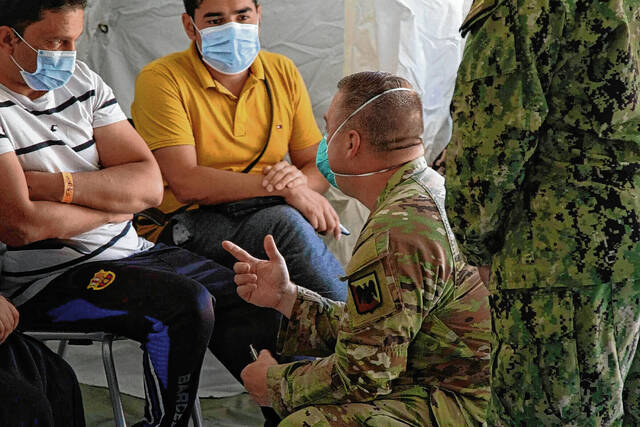
Photo by Sgt. Dylan Bailey, Camp Atterbury Indiana National Guard
Sgt. 1st Class Joseph Stringer interprets for Afghan guests during medical screening on Sept. 10 at Camp Atterbury. Task Force Atterbury, consisting of active-duty and National Guard service members supporting the federal mission, have provided housing, medical, logistics and transportation for the Afghan evacuees.
CAMP ATTERBURY — The federal government announced the final group of Afghan refugees temporarily housed at Camp Atterbury have departed the base, effective Wednesday.
Camp Atterbury, Indiana is the fifth of eight Department of Defense (DOD) installations supporting the resettlement of Afghan nationals, also known as “safe havens,” to complete operations. To date, more than 66,000 Afghan evacuees have been resettled in communities across the country. These resettlement efforts are led by the Department of State in close coordination with more than 290 local resettlement affiliates.
“As operations at Camp Atterbury come to an end, we are grateful for the partnerships that state and local leaders, the Indiana National Guard, non-profit organizations, and Hoosiers across the state have forged with our team as we helped our Afghan allies through the resettlement process,” said Robert J. Fenton, Jr., Senior Response Official for Operation Allies Welcome. “Over the last five months, through a whole-of-society effort, Operation Allies Welcome has helped more than 66,000 Afghan evacuees begin their new lives in America.”
DOD continues to provide temporary housing facilities for the remaining approximately 9,000 vulnerable Afghans who are in the process of completing their resettlement while at the following three military installations: Fort McCoy, Wisconsin; Fort Pickett, Virginia; and Joint Base McGuire-Dix-Lakehurst, New Jersey.
As of January 27, the U.S. has welcomed more than 76,000 Afghans to the United States through Operation Allies Welcome, providing them with support and assistance as they begin their new lives in America – and there may be more over the coming weeks and months. Prior to entering the United States, Afghan evacuees must successfully complete a rigorous, multi-layered screening and vetting process that includes biometric and biographic screenings conducted by intelligence, law enforcement, and counterterrorism professionals from multiple federal agencies.
Afghan evacuees also receive critical vaccinations – which include measles, mumps, and rubella (MMR), varicella, polio, COVID-19, and others – as a condition of their humanitarian parole. All OAW arrivals are tested for COVID-19.




